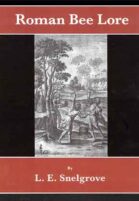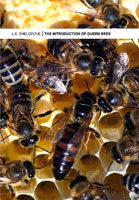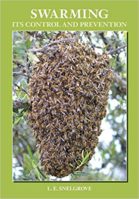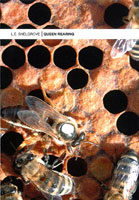REVIEW by Michael Freedman FCA, FPFS
“
Snelgrove was a school master and bee inspector for Somerset, he gained a MSc for research into bee diseases in 1920 and a MA in 1922 for Beekeeping in Roman Times, and was a life member of the BBKA and a past president. As a classicist, it enabled him to read the ancient writings of the classical writers. He wrote Roman Bee Lore as his paper for his MA earned from Bristol University in 1922. His typed manuscript dated April 1922 came into my possession in 2018, following the death of David Smith and on this Snelgrove had written that he hoped to revise and publish it but he never did.
I was amazed to find this and realised at once that this was a great repository of knowledge and research by a Bee-master and Classical scholar with literary skills.
We know that beekeeping was widely practiced in the Roman Empire and of the famous classical writers that Snelgrove lists, but few of these had been translated, so his ability to read and understand from primary sources makes this a unique bringing together from of all available knowledge from this era, when sugar was not used and bee products were vital commodities.
Snelgrove combines his fluency in Latin and Greek with his skills as a bee-master to present these findings in a most readable and literary style. Much of modern society has its roots in Roman Law and social structure.
He was a man who could unlock the secrets of the past and bring them into focus with modern bee lore and practice.
Undoubtedly, had this work been published 100 years ago, as it should have been, he would have ranked in the pantheon of great beekeeping writers, such as Cowan and Herrod-Hempsall.
His later works on Swarming and Queen Bees are regarded as standard works of their time and are still reproduced.
It is to my great delight that.it has been possible to share this scholarly and interesting work with present day apiculturists. As they say “better late than never”.
“
Until the end of the 18th.century the didactic Greek and Latin writers on Agriculture were widely regarded as authoritative in their views and their writings, or later works based on them, commonly served as practical guides in husbandry. Modern developments in agricultural science and practice, however, have so largely detracted from their value that with one or two exceptions they are not now published in any language and it is exceedingly difficult to obtain copies of them either in the languages in which they were originally written or in translations.
In this paper I have collated and commented upon practically everything of importance in the old Latin writings relating to Bees and have, perhaps, rescued from oblivion a great deal of information respecting ancient beekeeping which should prove to be quite new to British readers and also, I hope, not uninteresting to many who are not engaged in the delightful pursuit of Apiculture.
In my treatment of what has proved to be a rather complicated subject I have endeavoured to show that the Romans not only possessed apiarian knowledge far more considerable than is commonly supposed and that in many respects they were in advance of rustic beekeepers of to-day, but also that the art of beekeeping remained practically stationary throughout mediaeval times.
In order to make my subject more intelligible to the lay reader I have given such information respecting Natural History and Modern Beekeeping as from time to time appeared to be necessary, and for the convenience of the examiner I have included in the text a large number of quotations, many of which, if this paper be published, will be omitted altogether or written as foot-notes.
Except in the cases of Varro and Vergil I know of no modern commentaries on the Latin writings on Apiculture. The old annotations available have proved of little value for the purpose of this paper, not so much because they are sometimes inaccurate, as because their scholarly authors frequently accepted without comment statements which were not technically true and, on account of lack of practical experience, omitted to interpret others so as to give them force and meaning in the light of the apicultural knowledge of their times. I have preferred, therefore, as a rule, to give my own comments and interpretations rather than to review those made by others.






